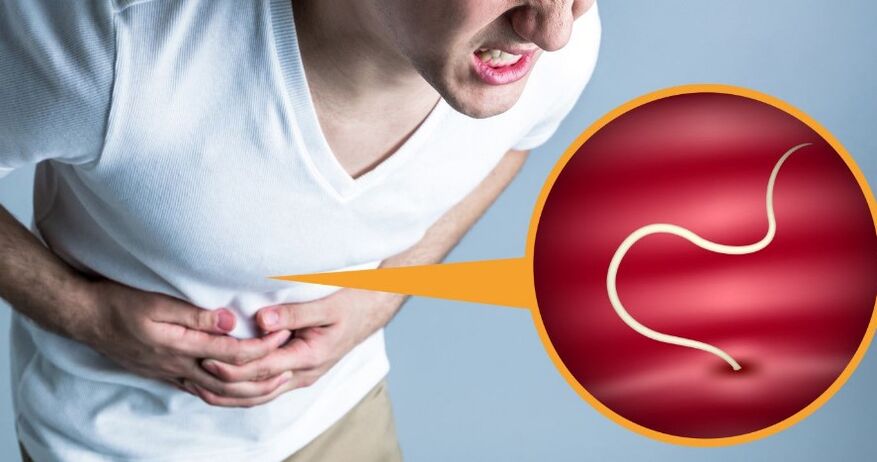In addition to the "normal" microorganisms that continue to live in the human body, we are also exposed to pathogenic parasites in the external environment.Eating raw or badly welded meat and close communication with your pet are the two most common ways to get infected.Since parasite invasions are very common, it is important to learn how to identify symptoms of a disease.Let’s discuss the main signs of the presence of parasites in the human body and list the possible causes of their occurrence.

How to suspect worm disease?
The most common gut parasites that live in a person are considered lamblia, hok worm, tape worm, pinworm, candida.
So, for example, hookworms are narrow worms attached to the inner wall of the host intestine.Once there, they grow and reproduce, stealing nutrients and preventing them from being absorbed by the owner's cells.The larvae of the worm can penetrate the skin and can be sucked into the eggs by a person.The source of eggs and larval hookworms is animal feces and raw meat.Remember that pets clean themselves with their tongue.Hookworm larvae are often encountered that connect to the fur and enter the human body through kissing.Symptoms of hookworm infection:
- Blood on the chair;
- Blood in the sputum in the cough;
- Gas formation and bloating;
- Nausea and vomiting;
- Pale skin;
- Anemia;
- Loss of appetite;
- Frequent uncontrolled crying in infants (children's colic).
 To better understand the problem, we also noticed General symptoms Signals indicate the presence of protozoa, multicellular, and other organisms in the human body to a parasitic lifestyle:
To better understand the problem, we also noticed General symptoms Signals indicate the presence of protozoa, multicellular, and other organisms in the human body to a parasitic lifestyle:
- Chronic digestive problems: flatulence, constipation, diarrhea, nausea, vomiting.
- Abdominal pain: stomach disorder, cramps, weakness.
- The chair is liquid, mucus.There are worm eggs or fungal spores on the chair.
- Craving for sweetness, persistent hunger, increased appetite or loss of appetite.
- Repeated food poisoning cases.
- A feeling of fatigue, fatigue, mood swings, muscle and joint pain, general discomfort, shortness of breath, cough, asthma.
- Eczema, skin rash in the form of urticaria.
- Poor sleep, insomnia, nightmares, night sweats, polishing in dreams.
- Vaginal itching, anal itching, rash and vaginal infection around the vulva.
- General condition decreases: inexplicable weight, nutritional deficiency, dehydration, fever, loss/increase of nerve fatigue.
- Autoimmune diseases.
Symptoms of brain injury
Unfortunately, despite the serum brain barrier, parasites can enter the brain and settle there.These include pork tapeworms that cause bladder; Naegleria Fowler, which stimulates the development of primary meningitis; Toxoplasma gondii is the easiest, leading to toxic agents.
- Heart is one of the earliest symptoms people who infect these dangerous creatures may experience.Head pain is often accompanied by sensitivity to light, and vision is clouded.
- Memory issues, disoriented, unable to make decisions - signs that parasite infections are growing and affecting brain tissue.
- Fever develops into a response to malicious microorganisms, and this response continues to develop.In this case, the immune system is activated.
- Naguity that occurs when larvae attach to the cavity with brain fluid.
 Brain malformations (too much fluid accumulation in the brain) occur as the disease progresses.
Brain malformations (too much fluid accumulation in the brain) occur as the disease progresses.- Twitching, loss of balance, paranoia, hallucination are important signs of brain damage to the terrible "immigrants".
Signs of lung lesions
Trematodes are parasitic worms that infect light and other internal organs.Pathogens are usually found in seafood, and if swallowed, they can enter the pancreas, liver, lungs from the intestine.Patients may notice unpleasant symptoms due to parasitic infections.
- Coughing can begin with dryness, irritation and cough that develops into red veins.
- There are severe pain in the chest and abdomen due to inflammation.
- Fever.Severe cases lead to fever.
- Diarrhea.
- The frequent occurrence of pneumonia or bronchitis, which may indicate the possible localization of worms in the lungs.Parasites also help develop lung abscesses.
Who is at risk
In many cases, parasite infections are caused by a person's daily activities and lifestyle.Experts say the main reasons for invasion development:
- Eating infected meat, fish, and water;
- Parasites in pets;
- Unhealthy hygiene;
- The habit of walking barefoot.
Intestinal parasites are not always manifested by characteristic symptoms.Therefore, in many areas with high risk (going to different foreign countries; owning livestock; living in areas with poor sanitation; areas with weak immunity), it is necessary to observe purification schemes: prevention 1-2 times a year.Other risk factors include children and elderly patients, educators working in preschool institutions of children, and boarding schools.
Parasite Types
We will express the main types of intestinal parasites and the methods for infecting them.So if you are used to poking dirty hands in your mouth and can nail your nails, you can get Pinworms.Usually, pinworms are found in children.As mentioned above, hookworms are “picked up” when walking barefoot when in contact with animal feces or infected soil.Elasticity occurs when an infected organism, water, fish or snail is used.If you eat hot meat containing larvae, the round worm can affect the body.
How to identify them
Today, medical staff use various laboratory tests to identify and diagnose parasites in the human body.Usually in this case, they are appointed to:
- Calais analysis of vermis;
 Serological blood tests for searching antibodies or parasite antigens;
Serological blood tests for searching antibodies or parasite antigens; - Blood tests under a microscope;
- X-Ray, MRI, CT;
- Scotch tape, for the presence of PINworms;
- Endoscopy (through the oral cavity) and colonoscopy (through the rectum) can be used to study the digestive tract.
Precautions
Ensure that you wash your hands every time after each touch of the animal.It is also worth excluding products that may cause pathogen infection (native or non-fried meat, fish, land).
If you suspect someone has lived and parasitized in your body, you can use rectal isolation - a special procedure to remove the intestines of ozone acid mixture, effectively destroying the worm and eliminating the toxic waste of its important activity.Includes anti-spastion products, herbs, vitamins and multi-enzyme additives in the diet.
To improve and restore healthy gut flora, take probiotics as well as turmeric, ginger, garlic, pumpkin seeds, oregano oil (organo), which are harmful to parasites.Exclude refined sugars, simple carbohydrates (white bread, clean rice) from the menu to stop the candidate's fungus growth.
We hope our article will help you recognize the first signs and symptoms of the presence of a parasite, will enable you to consider the consequences and will be a reason to quickly seek a doctor!

















